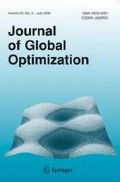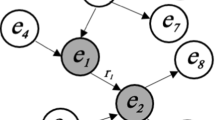Abstract
As business information quickly varies with time, the extraction of knowledge from the related dynamically changing database is vital for business decision making. For an incremental learning optimization on knowledge discovery, a new incremental matrix describes the changes of the system. An optimization incremental algorithm induces interesting knowledge when the object set varies over time. Experimental results validate the feasibility of the incremental learning optimization.
Similar content being viewed by others
References
Bang W., Bien Z.: New incremental learning algorithm in the framework of rough set theory. Int. J. Fuzzy Syst. 1, 25–36 (1999)
Baourakis G., Conisescu M., van Dijk G., Pardalos P.M., Zopounidis C.: A multicriteria approach for rating the credit risk of financial institutions. Comput. Manage. Sci. 6(3), 347–356 (2009)
Campana, E., Fasano, G., Pinto, A.: Dynamic analysis for the selection of parameters and initial population, in particle swarm optimization. J. Glob. Optim. (2010). doi:10.1007/s10898-009-9493-0
Chan C.: A rough set approach to attribute generalization in data mining. Inf. Sci. 107, 177–194 (1998)
Chen, H., Li, T., Liu, W. Zou, W.: Research on the approach of dynamically maintenance of approximations in rough set theory while attribute values coarsening and refining. In: Proceedings of 2009 IEEE International Conference on GrC, pp. 45–48 (2009)
Chen H., Li T., Qiao S., Ruan D.: A rough set based dynamic maintenance approach for approximations in coarsening and refining attribute values. Int. J. Intell. Syst. 25(10), 1005–1026 (2010)
Cody W., Kreulen J., Krishna V., Spangler W.: The integration of business intellegence and knowledge management. IBM Syst. J. 41(4), 697–713 (2002)
Floudas, C., Pardalos, P.M.: Encyclopedia of Optimization, 2nd ed., XXXIV, 4626 pp. Springer (2009)
Goyal M., Lu J., Zhang G.: Decision making in multi-issue e-market auction using fuzzy attitudes. J. Theor. Appl. Electron. Commer. Res. 3, 97–110 (2008)
Han J., Kamber M.: Data Mining: Concepts and Techniques. Corgan Kaufmann Press, San Fransisco (2006)
Hu, F.,Wang, G., Huang, H.,Wu, Y.: Incremental attribute reduction based on elementary sets. In: RSFDGrC2005, LNAI, vol. 3641, pp. 185–193 (2005)
Hu, J., Chang, H., Fu, M., Marcus, S.: Dynamic sample budget allocation in model-based optimization. J. Glob. Optim. (2009). doi:10.1007/s10898-009-9493-0
Jerzy B., Slowinski R.: Incremental induction of decision rules from dominance-based rough approximations. Electron. Notes Theor. Comput. Sci. 82, 40–51 (2003)
Li T., Ruan D., Wets G., Song J., Xu Y.: A rough sets based characteristicrelation approach for dynamic attribute generalization in data mining. Knowl. Based Syst. 20, 485–494 (2007)
Liu D., Li T., Ruan D., Zou W.: An incremental approach for inducing knowledge from dynamic information systems. Fundam. Inform. 94, 245–260 (2009)
Liu, D., Li, T., Chen, H., Ji, X.: Approaches to knowledge incremental learning based on the changes of attribute values. In: Proceedings of the 4th International Conference on Intelligent Systems and Knowledge Engineering, pp. 94–99 (2009)
Liu, D., Li, T., Liu, G., Hu, P.: An approach for inducing interesting incremental knowledge based on the change of attribute values. In: Proceedings of 2009 IEEE International Conference on Granular Computing, pp. 415–418 (2009)
Liu, D., Zhang, J., Li, T.: A probabilistic rough set approach for incremental learning knowledge on the change of attribute. In: Proceedings of 2010 International Conference on Foundations and Applications of Computational Intelligence, pp. 722–727 (2010)
Lu, J., Ruan, D., Zhang, G.: E-service intelligence-Methodology, Technologies and Applications, E-service Intelligence. pp. 1–33. Springer, (2007)
Lu J., Bai C., Zhang G.: E-service cost benefit evaluation and analysis, E-Service Intelligence, pp. 389–409. Springer, New York (2007)
Lu J., Bai C., Zhang G.: Cost-benefit factor analysis in e-services using bayesian networks. Expert Syst. Appl. 36, 4617–4625 (2009)
Pardalos, P.M., Hansen, P.: Data Mining and Mathematical Programming. American CRM Proceedings & Lecture Notes, vol. 45, 234 pp. American Mathematical Society (2008)
Pawlak Z.: Rough sets. Int. J. Comput. Inf. Sci. 11, 341–356 (1982)
Pawlak Z.: Rough set theory and its application to data analysis. Cybern. Syst. 29, 661–688 (1998)
Qian Y., Liang J., Pedrycz Z., Dang C.: Positive approximation: an accelerator for attribute reduction rougt set theory. Artif. Intell. 174, 597–618 (2010)
Shaku, A.: The top 10 critical challenges for business intelligence success. Retrieved from http://www.computerworld.com/computerworld/records/images/BusIntellWPonline.pdf
Shan L., Ziarko W.: Data-based acquisition and incremental modification of classification rules. Comput. Intell. 11, 357–370 (1995)
Sanati F., Lu J.: Life-event modelling framework for E-government integration. Electron. Gov Int. J. 7, 183–202 (2010)
Tong, L.: An: incremental learning of decision rules based on rough set theory. In: Proceedings of the World Congress on Intelligent Control and Automation (WCICA2002), pp. 420–425 (2002)
Tsumoto, S.: Extraction of experts’ decision process from clinical databases using rough set model. In: Proceedings of PKDD 1997, pp. 58–67 (1997)
Tsumoto, S.: Accuracy and coverage in rough set rule induction. In: Alpigini, J. et al. (eds.) RSCTC 2002, LNAI, vol. 2475, pp. 373–380. (2002).
Wong S., Ziarko W., Pawlak A.: Algorithm for inductive learning. Bull. Pol. Acad. Sci. Tech. Sci. 34, 271–276 (1986)
Yao Y., Wong S.: A decision theoretic framework for approximating concepts. Int. J. Man Mach. Stud. 37(6), 793–809 (1992)
Yao, Y.: A partition model of granular computing. Transactions on Rough Sets I, pp. 232–253 (2004)
Yao, Y.: Integrative levels of granularity. In: Human-Centric Information Processing Through Granular Modelling, pp. 31–47 (2009)
Yao Y.: Three-way decisions with probabilistic rough sets. Inf. Sci. 180(3), 341–353 (2010)
Zhang, G., Lu, J.: Fuzzy bilevel programming with multiple objectives and cooperative multiple followers. J. Glob. Optim. (2008). doi:10.1007/s10898-008-9365-z
Zheng Z., Wang G.: RRIA: a rough set and rule tree based incremental knowledge acquisition algorithm. Fundam. Inform. 59, 299–313 (2004)
Ziarko W.: Variable precision rough set model. Comput. Syst. Sci. 46, 39–59 (1993)
Zopounidis, C., Pardalos, P.M.: Handbook of multicriteria analysis. Appl. Optim. 103, XXV, 455 pp (2010)
Author information
Authors and Affiliations
Corresponding author
Rights and permissions
About this article
Cite this article
Liu, D., Li, T., Ruan, D. et al. Incremental learning optimization on knowledge discovery in dynamic business intelligent systems. J Glob Optim 51, 325–344 (2011). https://doi.org/10.1007/s10898-010-9607-8
Received:
Accepted:
Published:
Issue Date:
DOI: https://doi.org/10.1007/s10898-010-9607-8




